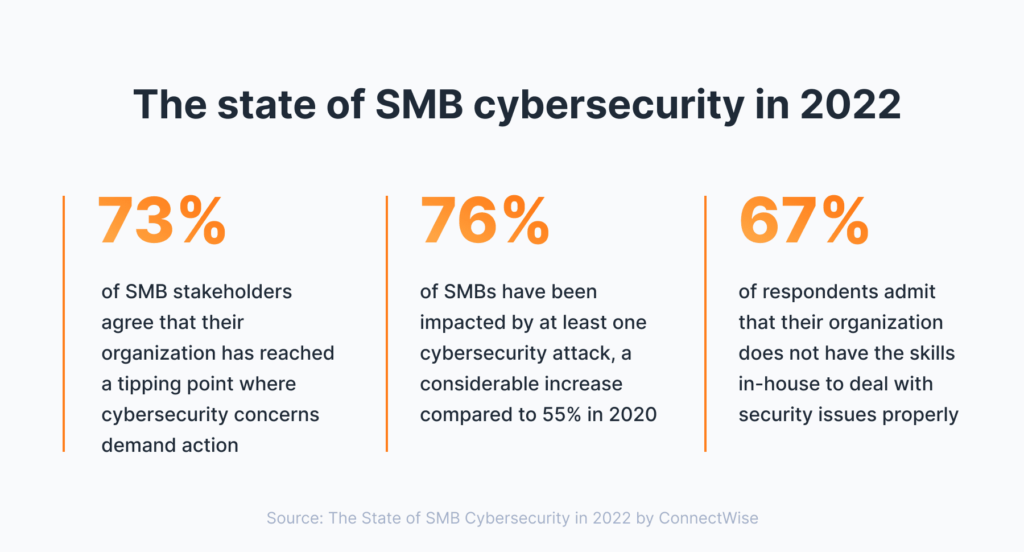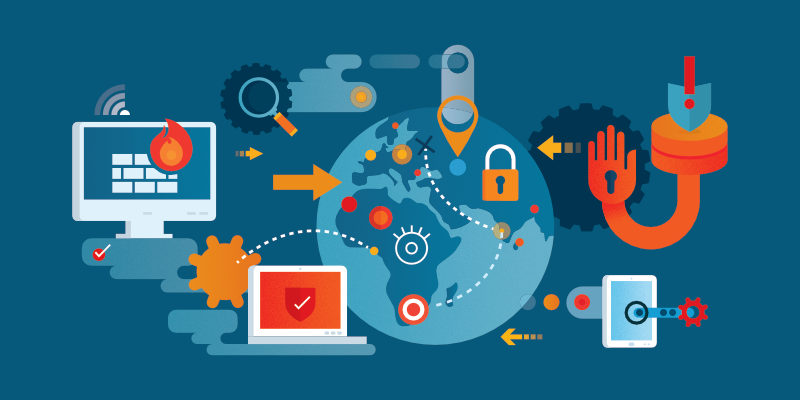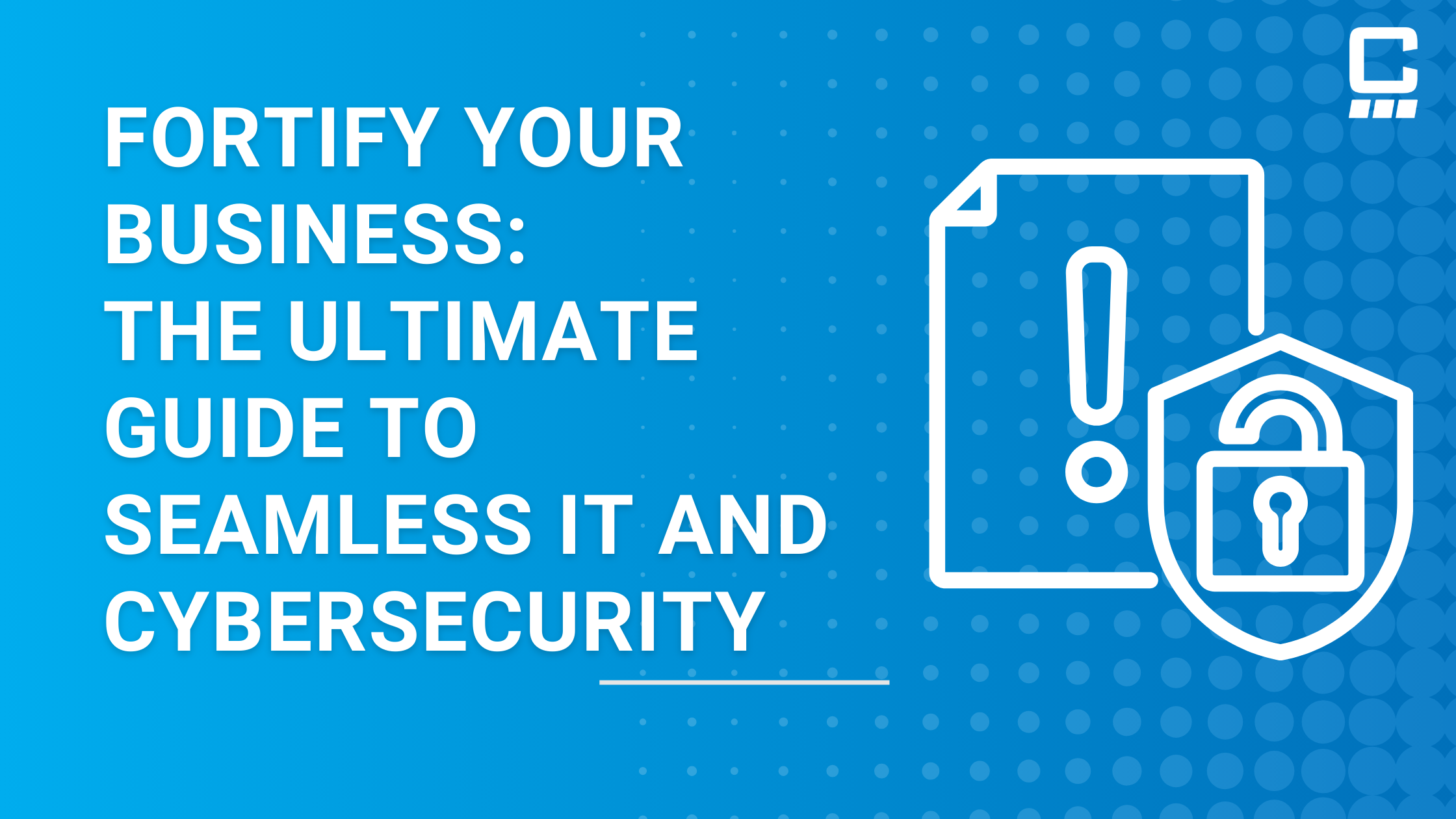In today’s digital world, small businesses face many online threats. Cybersecurity is essential for protecting data and operations.
Small businesses often think they are safe from cyber-attacks, but this is a mistake. Hackers target them because they usually have weaker security. Losing data or getting hacked can be costly and damaging. Protecting customer information is crucial for trust and reputation.
Effective cybersecurity solutions can save money and prevent business disruptions. They also help meet legal requirements and avoid penalties. Investing in cybersecurity is not just for big companies. Small businesses must prioritize it to stay safe and competitive. This blog will explore why cybersecurity is vital and how it can protect your business.

Credit: underdefense.com
Introduction To Cybersecurity
In today’s digital age, even the smallest business needs to be aware of cybersecurity. But what is cybersecurity? Simply put, it is the practice of protecting your computers, networks, and data from digital attacks. These attacks can come in many forms, from stealing sensitive information to crashing your systems. Cybersecurity solutions help prevent these issues, ensuring your business runs smoothly.
Importance For Small Businesses
Many small business owners think they are too small to be targeted. Unfortunately, this is not the case. In fact, small businesses are often seen as easy targets because they may not have strong security measures in place. Here are a few reasons why cybersecurity is crucial for small businesses:
- Protects Sensitive Information: Your customers trust you with their data. You must protect their information to maintain that trust.
- Avoids Financial Loss: Cyber attacks can be expensive. They can lead to financial losses from stolen money, lost sales, or even fines for data breaches.
- Maintains Reputation: If your business is known for being secure, customers will feel safer doing business with you.
Current Threat Landscape
The threat landscape is constantly evolving. Cybercriminals are becoming more sophisticated, and their tactics are changing. Here are some common threats small businesses face today:
- Phishing: These are fake emails or messages that try to trick you into giving away personal information.
- Ransomware: This type of malware locks your files and demands payment to unlock them.
- Malware: Harmful software that can damage or disrupt your systems.
Understanding these threats is the first step in protecting your business. By staying informed and implementing strong cybersecurity measures, you can safeguard your business from potential attacks.
So, what are you waiting for? It’s time to take cybersecurity seriously and protect your small business from digital dangers.
Common Cyber Threats
In the digital age, small businesses are increasingly targeted by cybercriminals. It’s essential to understand the common cyber threats to protect your business. In this section, we will explore three major cyber threats: phishing attacks, ransomware, and malware. By understanding these threats, you can take steps to protect your business and reduce the risk of a cyber attack.
Phishing Attacks
Phishing attacks are one of the most common and dangerous cyber threats. They usually come in the form of emails that appear to be from a trusted source. These emails often contain links or attachments that, when clicked, can steal sensitive information or install malicious software on your computer.
Here are a few tips to avoid phishing attacks:
- Always verify the sender’s email address.
- Do not click on suspicious links or attachments.
- Use email filtering tools to block phishing emails.
Remember, if something seems too good to be true, it probably is!
Ransomware
Ransomware is a type of malware that encrypts your files and demands a ransom to unlock them. It’s a nightmare scenario for any business. Imagine waking up one day to find all your important data inaccessible unless you pay a hefty sum to cybercriminals. Sounds scary, right?
To protect your business from ransomware:
- Regularly back up your data.
- Keep your software and systems up to date.
- Train your employees to recognize and avoid suspicious emails and links.
Preparation is key. It can save you a lot of headaches and money in the long run.
Malware
Malware, short for malicious software, is designed to harm your computer system. It can come in many forms, such as viruses, worms, trojans, and spyware. Malware can steal, encrypt, or delete your data, and even take control of your system.
Here are some steps to protect your business from malware:
- Install and update antivirus software regularly.
- Use a firewall to block unauthorized access to your network.
- Be cautious when downloading software from the internet.
Think of malware as the digital equivalent of termites. They can quietly eat away at your business from the inside out.
In conclusion, understanding these common cyber threats and taking proactive measures can help safeguard your small business. Stay informed, stay vigilant, and don’t let cybercriminals catch you off guard!
Impact Of Cyber Attacks
The impact of cyber attacks on small businesses can be devastating. Cyber criminals target small businesses because they often lack robust defenses. This makes them easy prey. The consequences of an attack can ripple through every aspect of the business. Below are the primary impacts of cyber attacks on small businesses.
Financial Losses
Cyber attacks can lead to significant financial losses. Hackers may steal money directly from bank accounts. They might also demand ransom payments to unlock encrypted data. Additionally, businesses may face fines for data breaches. The costs of repairing the damage and implementing stronger security measures can be high. These expenses can be overwhelming for small businesses.
Reputation Damage
Reputation damage can be one of the most harmful effects of a cyber attack. Customers trust businesses with their personal information. A data breach can shatter this trust. Customers may take their business elsewhere. Negative publicity can spread quickly, harming the business’s image. Rebuilding trust and a tarnished reputation can take years.

Credit: appinstitute.com
Benefits Of Cybersecurity Solutions
Cybersecurity solutions are essential for small businesses. They protect against data breaches and cyber threats. These solutions offer many benefits. They enhance data protection and build customer trust.
Data Protection
Small businesses handle sensitive information. This includes customer details, financial records, and proprietary data. Cybersecurity solutions shield this data from theft and damage. They use encryption, firewalls, and antivirus software to keep data secure. With proper data protection, businesses can avoid costly breaches. They can also ensure the integrity of their operations.
Customer Trust
Customers expect their information to be safe. Trust is crucial for customer loyalty. Cybersecurity solutions help businesses safeguard customer data. This shows a commitment to security and privacy. When customers feel secure, they are more likely to stay loyal. They will also recommend the business to others. Building customer trust leads to long-term success.
Essential Cybersecurity Measures
In today’s digital age, small businesses are increasingly vulnerable to cyber threats. Without proper protection, they risk losing sensitive data, facing financial losses, and damaging their reputation. That’s why implementing essential cybersecurity measures is crucial. These measures not only safeguard your business but also provide peace of mind. Let’s delve into some key strategies that every small business should adopt.
Firewalls And Antivirus
Think of a firewall as your business’s first line of defense. It acts like a security guard, monitoring incoming and outgoing traffic to block anything suspicious. Pairing this with reliable antivirus software ensures that any malicious software trying to sneak in gets detected and removed.
- Firewalls: These can be hardware-based or software-based. They filter traffic and block unauthorized access.
- Antivirus Software: Regular scans help detect and quarantine viruses, malware, and other threats.
Remember the time when your computer suddenly slowed down, and you couldn’t figure out why? That was probably a virus at work. With a strong firewall and antivirus, such incidents become rare, if not nonexistent.
Regular Software Updates
Keeping your software up to date is like giving your business a protective shield. Software updates often include patches for security vulnerabilities that hackers can exploit.
- Automatic Updates: Enable automatic updates whenever possible. This ensures you’re always protected with the latest security patches.
- Manual Checks: For software that doesn’t update automatically, schedule regular checks to ensure you’re not missing critical updates.
Imagine you’re sailing a boat with tiny holes. If you don’t patch those holes, you’ll eventually sink. Similarly, ignoring software updates can leave your business exposed to cyber attacks. So, stay afloat by keeping everything up to date!
By focusing on these essential cybersecurity measures, small businesses can significantly reduce their risk of cyber threats. It’s like having a robust security system for your home—only this time, it’s for your valuable business data.
Employee Training
Employee training plays a crucial role in protecting small businesses from cyber threats. Educating staff about cybersecurity can prevent many potential risks. Well-informed employees can identify and avoid threats more effectively. Let’s explore how training can help in key areas.
Recognizing Threats
Employees must learn to recognize various cyber threats. This includes phishing emails, suspicious links, and fake websites. Phishing emails often look genuine. Employees should know how to spot unusual requests or errors. Regular training sessions can help them stay updated on new threats.
Safe Online Practices
Safe online practices are essential for cybersecurity. Employees should use strong, unique passwords for different accounts. They must avoid sharing sensitive information over unsecured networks. Training should also cover the importance of regular software updates. These updates often include security patches that protect against new threats. Lastly, employees should know how to report any suspicious activity immediately. This helps in taking quick action to prevent damage.
Choosing The Right Solutions
Small businesses must protect their data. Choosing the right cybersecurity solutions can be challenging. It involves assessing business needs and evaluating providers. Let’s break it down step by step.
Assessing Business Needs
Every small business has different needs. Start by identifying what you need to protect. Is it customer data? Financial records? Or perhaps your website? Make a list of your critical assets.
Next, consider the risks. Are you worried about phishing attacks? Malware? Or data breaches? Understanding your risks helps in choosing the right solutions. Prioritize what matters most to your business.
Think about your budget too. How much can you spend on cybersecurity? Remember, investing in security now can save money later. Cyber attacks can be costly.
Evaluating Providers
Once you know your needs, start looking at providers. Research their reputation. Read reviews and ask for recommendations. A good provider should have a solid track record.
Check what solutions they offer. Do they provide antivirus software? Firewalls? Or perhaps employee training? Make sure their services match your needs.
Consider their support options. Can you reach them easily? Do they offer 24/7 support? Good customer service is crucial in times of crisis.
Compare prices. Don’t always go for the cheapest option. Quality matters. A good provider will offer value for money.
Finally, ask for a demo. See how their solutions work. A demo can help you decide if a provider is right for you.

Credit: blog.charlesit.com
Future Of Cybersecurity
The future of cybersecurity holds both promise and challenges. As technology evolves, so do the threats. Small businesses need to stay ahead of these changes. Understanding emerging trends can help. Let’s explore what the future holds.
Emerging Technologies
Artificial intelligence is transforming cybersecurity. AI can detect threats faster than humans. It learns from data and predicts attacks. This makes systems more secure.
Blockchain technology is another breakthrough. It offers secure transactions. Data stored in blocks is hard to alter. This makes it difficult for hackers to tamper with information.
Quantum computing is still in its early stages. Yet, it promises to be powerful. Quantum computers can solve complex problems quickly. They can improve encryption techniques. This means stronger security for small businesses.
Ongoing Challenges
Cyber threats are always evolving. Hackers create new methods to breach systems. This is a constant challenge for small businesses.
Many small businesses lack resources. They may not afford advanced security systems. This leaves them vulnerable to attacks.
Employee training is crucial. Many breaches occur due to human error. Employees must know how to recognize threats. Regular training can help prevent these mistakes.
Staying updated with the latest security measures is vital. Technology changes rapidly. Small businesses must keep up to protect their data.
Frequently Asked Questions
What Are The 5 Reasons Why Cybersecurity Is Important Now More Than Ever?
1. Cyberattacks are increasing rapidly. 2. Sensitive data needs protection. 3. Businesses face financial losses. 4. Trust and reputation are at stake. 5. Regulatory compliance is mandatory.
Do 60% Of Small Businesses Fail After A Cyber Attack?
Yes, 60% of small businesses fail after a cyber attack due to financial losses and damaged reputations. Protect your business with strong cybersecurity measures.
Why Should A Small Company Spend Money Identifying And Managing Its Security Risks?
Identifying and managing security risks protects sensitive data, prevents financial losses, and ensures business continuity. It builds customer trust and enhances company reputation.
What Are The 5 Benefits Of Using Cyber Security?
1. Protects sensitive data from theft and damage. 2. Prevents unauthorized access to computer systems. 3. Reduces risk of cyber attacks and breaches. 4. Enhances overall security and business continuity. 5. Boosts customer trust and confidence in your services.
Conclusion
Small businesses must prioritize cybersecurity solutions for their growth. Cyber threats target vulnerable systems, causing severe damage. Protecting data builds customer trust. Investing in cybersecurity ensures smooth operations. Avoid costly breaches and downtime. Stay ahead of cybercriminals. Simple steps can offer strong protection.
Regular updates and training are crucial. Safeguard your business today. Make cybersecurity a top priority. Your business’s future depends on it.

